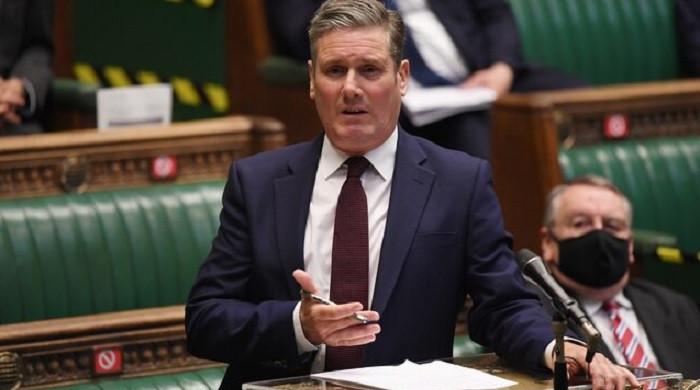 |
| Britain's Labour Party leader, Keir Starmer, speaks during a session in Parliament, in London, Britain.— Reuters/File |
Keir Starmer Reshuffles Cabinet After Angela Rayner Resigns Over Tax Scandal
Britain's Labour Party leader,
Keir Starmer, speaks during a session in Parliament, in London, Britain.—
Reuters/File UK Prime Minister Keir Starmer overhauled his ministerial team on
Friday in a bid to reset his embattled government after deputy premier Angela
Rayner resigned for...
UK Prime Minister Keir Starmer
carried out a sweeping cabinet reshuffle on Friday after his deputy, Angela Rayner,
resigned over a property tax controversy. The move marks the first major
shake-up of Starmer’s 14-month-old government, which has been struggling to
gain momentum amid sliding poll numbers and rising pressure from the right-wing
Reform UK party.
Rayner, a key figure on Labour’s left, admitted earlier this week that she had underpaid stamp duty on an £800,000 seaside flat in Hove. Following an ethics inquiry that concluded she had breached the ministerial code, Rayner stepped down from her roles as deputy prime minister, housing minister, and Labour’s deputy leader. In her resignation letter, she expressed “deep regret” and admitted she had not sought proper specialist tax advice.
A Major Reshuffle
Rayner’s resignation prompted Starmer
to quickly reset his top team. In a series of high-profile moves:
- David Lammy, who had been serving as foreign
minister, was named the new deputy prime minister.
- Yvette Cooper, previously the home secretary,
will now become Britain’s foreign minister.
- Shabana Mahmood, from Labour’s centrist wing,
takes over at the Home Office.
- Lammy will also shoulder the justice brief, effectively holding dual roles.
Downing Street confirmed further
changes across the environment, business, and science portfolios, with two
ministers dismissed outright.
The reshuffle underscores Starmer’s attempt to regain control of his government, which has faced repeated crises since ending 14 years of Conservative rule in July last year. From U-turns on welfare reforms to struggles with fuel benefits for pensioners, the administration has struggled to deliver on its central promise—reviving the UK economy. A tough budget is looming, adding to the pressure.
Rayner’s Exit and
Personal Story
Rayner’s downfall centered on her
purchase of the Hove flat. She had claimed the property as her main residence,
reducing the tax bill, despite still having a financial interest in her former
family home, held in trust for her disabled son. Ethics chief Laurie Magnus
concluded she had ignored clear legal warnings and breached the ministerial
code.
In her defense, Rayner explained that
she had sold her share of the family home after her 2023 divorce to ensure her
son, who was born prematurely and is registered blind, could remain secure in a
specially adapted house. She admitted her mistake but stressed her intention
had been to safeguard her child’s future.
Rayner, 45, has long been seen as one
of Labour’s most relatable figures. Raised in Stockport, one of
England’s most deprived areas, she left school at 16 with no qualifications
after becoming pregnant. Her outspoken, straight-talking style made her a
champion for working-class voters and fueled speculation that she might one day
lead Labour herself.
Despite her resignation, Starmer told her she remained “a major figure in our party.”
Political Fallout
Rayner’s exit is another setback for a
government already under fire. Starmer has faced criticism for failing to
control illegal migration across the English Channel—a key issue that has
boosted support for Nigel Farage’s Reform UK. Shabana Mahmood will now
inherit the politically charged migration portfolio.
Observers say Starmer’s shake-up
signals both urgency and vulnerability. Patrick Diamond, a former
Downing Street policy adviser, described the changes as “a clear sign that
Starmer feels his government has been unsatisfactory and ministers urgently
need to get a grip to deliver substantive change.”
But Diamond also warned that turbulence could deepen, with Labour now needing to elect a new deputy leader to replace Rayner. “The aftershocks of Rayner’s resignation may well undermine the government’s ability to deliver in the year ahead,” he said.
A Government Under
Pressure
For Starmer, the reshuffle is as much
about political survival as it is about policy. His government has struggled to
hold public confidence while Reform UK surges in popularity with its hardline
stance on immigration and national identity.
Whether this cabinet reset will steady
the ship or simply add to the turmoil remains to be seen. But one thing is
clear: with Rayner gone and Labour’s internal divisions laid bare, Starmer
faces one of the toughest tests of his leadership yet.
